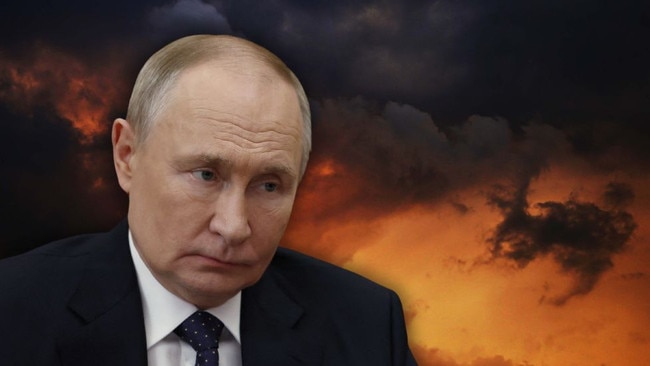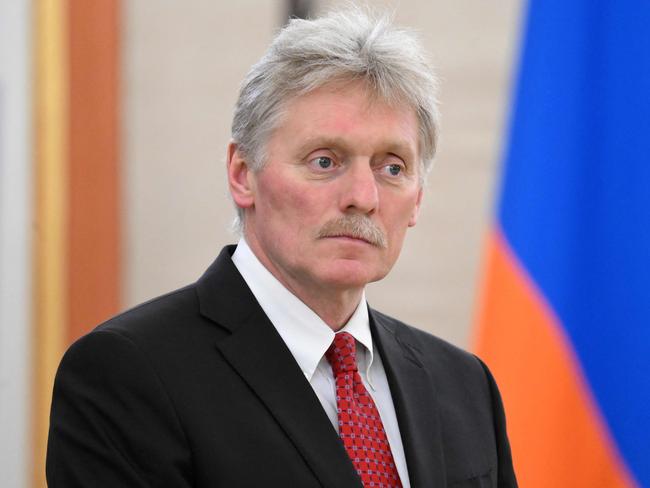Putin’s nuclear bang is more of a whimper
We shouldn’t be fooled by apocalyptic threats – even Russians are losing faith.

As deterrence goes, this was not effective. Last week President Putin warned that he had changed the doctrine governing Moscow’s use of nuclear weapons, to authorise a strike against other nuclear powers should they license the use of conventional weapons to attack Russian territory. Ukraine duly responded ... by for the first time using its new permission to fire missiles supplied by the US and the UK at military targets in Russia.
And now, World War Three? Not exactly. After prudently telling the US in advance what he was going to do, Putin fired a “new” intermediate-range ballistic missile configured for nuclear use, but without any such warhead, at a military base in the Ukrainian city of Dnipro - causing no casualties. It was the absolute minimum Putin could do not to lose face, especially given his warnings a few weeks ago that if the West started to attack Russian territory, he would respond with “overwhelming nuclear firepower”.
We have been here before, many, many times - starting on the day Putin unleashed his full-scale invasion of Ukraine in February 2022, when he snarled in a television broadcast: “Whoever tries to interfere with us should know that Russia’s response will be immediate and will lead you to such consequences as you have never experienced before in your history”, adding that Russia was “today one of the most powerful nuclear states”.
But the West did interfere, and on a scale Putin can never have expected. The threat proved hollow. This has not prevented the Kremlin from continuing with the same attempt to terrorise the public in western nations, such as the UK, to deter their governments from escalating their aid. Since our countries began supplying Ukraine with weaponry to defend itself, the Centre for Strategic and International Studies estimates that Russian officials have invoked the use of nuclear weapons more than 200 times (good that someone has been counting).
There was one moment when Washington really believed that the Kremlin was seriously considering deploying tactical nuclear weapons in Ukraine. That was two years ago, when Russian forces were being pushed back in abject retreat. Two things then happened. President Biden sent the CIA director, William Burns, to Moscow in November 2022 to tell Sergei Naryshkin (his opposite number as head of the SVR) what the US would do if Moscow “went nuclear”. Afterwards Burns recalled: “Naryshkin swore that he understood and that Putin did not intend to use a nuclear weapon.” And, second, as the military historian Phillips O’Brien put it in a paper for the Bulletin of the Atomic Scientists: “China ... publicly humiliated Russia by forcing Putin, in the midst of all his nuclear sabre-rattling, to agree a joint communique with President Xi, in which Putin disavowed the use of nuclear weapons.”
The reason Putin might, at that point, have been seriously considering tactical nuclear weapons was that it seemed Russia might be “losing”. But now the Kremlin will feel much less anxious about the state of the war (even though a “special military operation” that Moscow thought would end in absolute victory within a fortnight has passed 1,000 days). And for the same reason Putin, far from seeking a negotiation of the sort President-elect Trump may envisage, is completely set on extinguishing Ukraine as a sovereign state. Or, as the Kremlin’s spokesman, Dmitry Peskov, said last week, when asked if his boss would consider “freezing” the war along the territorial lines that now stand: “The president has repeatedly said that any option of freezing the conflict won’t work for us. It’s important for us to achieve our goals.”

Even if this were some sort of negotiating ploy in itself, there is no way Russia would now entertain the widely promoted notion of the sort of arrangement that has kept the peace between North and South Korea since that war was frozen in 1953. That armistice has been guaranteed by the presence of almost 30,000 US troops. Trump, given his view that the Ukraine war is fundamentally a European matter, would want countries such as the UK and France to be the force providers for such a garrison, but it is improbable that Putin would accept what amounted to a Nato force on the Ukraine-Russia border.
That is why those who are arguing most vociferously that the West must do whatever it can now to end the war with a sustainable peace deal should also be advocating the maximum amount of western lethal aid for Kyiv, to maximise Ukraine’s leverage. They aren’t, of course; but that is the only way Russia might be persuaded to abandon what Peskov called “our goals”.
However, there is another source of pressure on Putin, one that does not involve yet more slaughter. While western financial sanctions are widely derided, the situation on the economic front is turning ugly for Russia. Its policy of guns before butter - prioritising weapons manufacturing at the expense of everything else, including agricultural production - has had the inevitable consequences: the price of butter has soared. Also potatoes: the price of that staple has risen more than 60 per cent in the past year.
This is making for a most unhappy public mood, however suppressed. The Ukrainian mother, Vera, who has been living with us with her son since July 2022 is in constant communication with close relatives in Russia and tells me that they are unhappier than at any other stage of the conflict, as well as being, for the first time, physically frightened (because of the increasing penetration of Ukrainian drone attacks into Russia).
Last month the Russian central bank put up interest rates to an astounding 21 per cent. This suggests that Putin’s transformation of the economy into an overheated version of what the Soviets called “structural militarisation” may have similar disastrous effects. Sergei Chemezov, head of the Russian state defence conglomerate Rostec, complained: “If we continue to work like this, then most of our enterprises will go bankrupt.”
Apart from weapons production, that is. Oh, and vodka. After two decades of declining consumption of the national curse - one of Putin’s real triumphs, one might say - alcohol sales in Russia have spiralled upwards. Per head, the Russians, according to a report in The Times, “are now seeing off the equivalent of eight litres of pure alcohol each year”. And who knows how much more of the homemade, off-the-books hooch.
This is an expression of the war’s psychological toll on the Russian population: one that, unlike public dissent, cannot be muted by censorship or intimidation.
So, is Putin “winning"? Not, I suspect, in the minds of his people, whatever his own determination. And will he attack Nato countries with nuclear missiles, as he now threatens? No: the sadistic poisoner in the Kremlin would prefer to live.
The Sunday Times






To join the conversation, please log in. Don't have an account? Register
Join the conversation, you are commenting as Logout